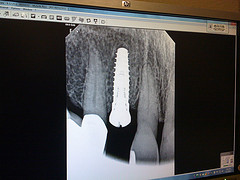Dental implants are a relatively new procedure that can permanently replace missing teeth even when there is no existing tooth to hold the crown in place. Many patients are choosing to have the surgery over traditional crowns and bridges, and implants provide a stronger and more aesthetically pleasing final result. Many dental surgeries across the UK now offer the procedure to their patients, and it can usually be completed with the use of a local anesthetic. The downside is that the procedure can be too expensive for some patients, but thankfully there are funding options available for those in need of treatment.
What Are Dental Implants?
A dental implant procedure involves placing a titanium implant into the jaw bone that provides a secure base for a new crown to be screwed onto. The implants can be placed into gaps that have no existing teeth at all, and there is no limit as to how many implants a patient can have. The entire procedure takes 2 – 3 months to complete as the implant needs time to fuse with the jaw bone. Many dental companies (such as Neoss) now develop titanium implants which reduce the chance of the body rejecting it.
What Funding Options Are Available?
The NHS does not usually fund dental implant surgery although there are exceptions to this rule. Patients who are suffering from eating or speaking disorders due to the loss of teeth may be eligible for help from their local primary care trust, and those who are experiencing psychological problems as a direct result of missing teeth can also apply. The NHS will also consider patients who are diagnosed with a cleft palate or congenital disease, and those who are undergoing reconstructive surgery as the result of an accident or trauma. Patients with an edentulous (without any teeth) jaw who are under the age of 45 may also be eligible for funding from the NHS. If you do not fall within one of these categories, it may be worthwhile visiting your local dental school to see if the procedure can be carried out by dental students. A growing number of patients are now turning to training colleges for their dental care, and many offer a 24-hour walk-in clinic.
Dental implants have the potential to greatly increase your quality of life, and offer confidence and peace of mind for those who suffer from physical and psychological problems as a result of missing teeth. They have the potential to last for a lifetime as long as proper oral hygiene is maintained, and the surgery can be completed without causing too much pain or discomfort to the patient. If you are considering dental implant surgery and wish to explore your funding options, you must first contact your local primary care trust to find out what help is available in your area. You may have to prove that you are experiencing problems due to your lack of teeth, and supporting evidence can be in the form of hospital documents or a letter from a certified psychologist in the case of psychological problems.
[toggle title=”Featured images”]
[/toggle]


Leave a Reply